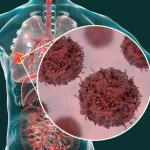Cancer is Striking Young People, and Scientists think a ‘New Exposure’ May Be Fueling It
The post Cancer is Striking Young People, and Scientists think a ‘New Exposure’ May Be Fueling It appeared first on Healthy Holistic Living.
In recent years, a disturbing trend has emerged in the health landscape: more young people are receiving diagnoses of early-onset colorectal cancer. Despite significant advancements in medical research and cancer treatment, this specific age group, surprisingly, faces a growing threat. This rise contrasts sharply with the overall decrease in colorectal cancer rates observed over the last two decades, which had brought hope of controlling this deadly disease.
Experts are unraveling the complex causes behind this alarming increase among individuals under 50 years old. It hints at a seismic shift in environmental, lifestyle, or possibly genetic factors that began affecting people born in the latter half of the 20th century. These young adults are now confronting a risk that their predecessors managed to avoid at similar ages, spotlighting a critical health issue that demands our immediate attention and action.
In this article, we will dive deep into the phenomena driving this increase in early-onset colorectal cancer. We’ll explore how changes introduced into our lives over the past few decades may be fueling this rise, and we will offer actionable advice to help mitigate these risks.
Understanding Early-Onset Colorectal Cancer
Early-onset colorectal cancer refers to the disease diagnosed in individuals under the age of 50. This definition not only marks a boundary for research but also serves as a crucial guideline for screening recommendations. Historically, experts considered colorectal cancer a condition affecting older adults, but the rising incidence in younger populations has shifted scientific perspectives and necessitated a reevaluation of our understanding and approach to this illness.
Differences from Later-Onset Colorectal Cancer
Unlike the colorectal cancers that appear in older adults, early-onset forms of the disease often manifest in the lower part of the colon and the rectum. These cancers tend to be more aggressive, which complicates treatment outcomes. Dr. Jeremy Kortmansky, a medical oncologist at Yale School of Medicine, notes that these cancers frequently display more aggressive histology under microscopic examination. This aggressive nature is likely a key factor in why these cancers are often diagnosed at a more advanced stage in younger patients.
Common Symptoms in Younger Patients
Young individuals with early-onset colorectal cancer might notice symptoms that are easy to dismiss as benign gastrointestinal issues. Common signs include rectal bleeding and changes in bowel habits, such as increased diarrhea or constipation. Many young people overlook these symptoms or attribute them to less serious conditions like hemorrhoids or irritable bowel syndrome. Unfortunately, this often leads to delays in seeking medical advice and subsequent late diagnoses.
Investigating the Causes
Recent findings have led researchers to propose that a “new exposure,” surfacing around the mid-20th century, could be fueling the rise in early-onset colorectal cancer. Rebecca Siegel, senior scientific director of surveillance research at the American Cancer Society, suggests that changes adopted during this period in lifestyle, environment, or perhaps unseen elements in our daily interactions might be implicated. Pinpointing these changes is crucial as they appear to disproportionately affect younger generations.
Key Lifestyle and Dietary Risk Factors
Diet and lifestyle play monumental roles in the health of our digestive system. In the past few decades, the Western diet has undergone significant transformations with an increase in processed foods and sugars, particularly high-fructose corn syrup. This sweetener, which became prevalent in numerous food products from the 1970s onwards, has been strongly linked to an array of health issues, including a spike in obesity rates and metabolic disorders, both of which are risk factors for colorectal cancer.
A sedentary lifestyle, another modern epidemic, also contributes significantly to the risk. The lack of physical activity not only worsens general health but specifically increases the likelihood of developing numerous forms of cancer, including those of the colon and rectum.
Early-Life Exposures
The conditions and environments to which we are exposed during early life—from the air we breathe to the food we consume—can have lasting impacts on our cancer risk. For instance, the widespread use of antibiotics and the increased consumption of processed foods can alter gut microbiota, potentially increasing susceptibility to diseases including colorectal cancer.
Furthermore, research highlighted in a 2022 study from the Journal of Clinical Oncology points to dietary and lifestyle changes initiated in the 1950s as significant contributors to the increased incidence seen today. This early-life exposure to new dietary components, combined with other lifestyle shifts, may require decades to manifest as cancer, explaining the recent rise in cases among younger adults.
The Role of Genetics and Obesity
Genetics play a pivotal role in the risk of developing early-onset colorectal cancer. If a family history of the disease exists, the likelihood of a person being diagnosed increases significantly. Dr. Jeremy Kortmansky notes that younger patients with early-onset colorectal cancer are more often those who have a direct relative who also had the disease at a young age. This genetic predisposition suggests that inherited genetic mutations or shared environmental factors within families could be contributing to the risk.
The Impact of Obesity and Hormonal Changes
Obesity markedly elevates the risk of various cancers, including colorectal cancer. The relationship between obesity and increased cancer risk partially stems from changes in hormone levels, such as increases in insulin and insulin-like growth factors that promote cell division and growth. Dr. Kortmansky explains that these hormonal changes create an environment conducive to cancer development. Additionally, fat tissue produces adipokines that can cause chronic inflammation, another known risk factor for cancer.
Research underscores the connection between obesity and an increased risk of developing early-onset colorectal cancer. A large prospective study published in JAMA Oncology involving over 85,000 women revealed that being overweight raises the risk of early-onset colorectal cancer by 37%, while obesity nearly doubles the risk, increasing it by 93%. These statistics highlight the significant impact that body weight can have on the likelihood of developing colorectal cancer at a young age.
Prevention and Early Detection
Early screening for colorectal cancer is a powerful tool in combating this disease, especially for those at higher risk due to genetics or lifestyle factors. Recognizing the trend of rising incidence among younger adults, the American Cancer Society recently lowered the recommended age for initial screening from 50 to 45 years. This change aims to catch the disease earlier when it is most treatable, reflecting the shift in understanding about when risk begins to escalate.
Adjusting lifestyle choices is among the most direct and impactful ways individuals can reduce their risk of colorectal cancer. Emphasizing a diet rich in fruits, vegetables, and whole grains while reducing processed meats and high-sugar foods can significantly decrease risk factors. Regular physical activity serves as another critical element, helping to maintain a healthy body weight and reduce inflammation, both of which lower cancer risk. These proactive steps are not just preventive; they enhance overall health and quality of life.
Screening Methods
Stool Tests
Advantages: Non-invasive and can be done at home. Stool tests are effective in detecting occult (hidden) blood, which can be an early sign of polyps or colorectal cancer.
Disadvantages: Less accurate than other methods; positive results require follow-up with more invasive tests, typically a colonoscopy.
Colonoscopy
Advantages: Considered the gold standard for colorectal cancer screening. It allows for the visual examination of the entire colon and the ability to remove polyps during the procedure.
Disadvantages: More invasive, requires preparation such as fasting and taking a bowel-clearing solution. There are small risks of complications like bleeding or perforation.
Each screening method has its benefits and drawbacks, but the key is regular monitoring, especially for those with increased risk factors. The choice of screening method should be made in consultation with a healthcare provider, considering personal risk factors and preferences.
Comprehensive Tips for Prevention
Adopting a proactive approach towards health can significantly reduce the risk of early-onset colorectal cancer. Here are some detailed recommendations for dietary and lifestyle changes, along with advice on the importance of regular screenings and understanding your family medical history.
Dietary Recommendations
Increase fiber intake: Consume a variety of fiber-rich foods such as fruits, vegetables, whole grains, and legumes. Dietary fiber helps move waste through your digestive system more quickly, reducing the contact time between potential carcinogens and the colon lining. Fiber also promotes a healthy gut microbiome, which is crucial for maintaining overall gut health.
Limit red and processed meats: Studies have linked high consumption of red and processed meats to an increased risk of colorectal cancer. Opt for leaner proteins like poultry, fish, or plant-based alternatives to reduce this risk.
Incorporate more calcium and vitamin d: Calcium-rich foods like dairy products, leafy greens, and fortified foods can help protect your colon cells from malignant transformations. Vitamin D, obtained from sunlight exposure, fortified foods, and supplements, also plays a role in cell growth regulation and immune function.
Avoid excessive alcohol and quit smoking: Alcohol has been associated with an increased risk of several cancers, including colorectal cancer. Smoking is a well-known risk factor for countless health issues, including colorectal cancer. Reducing alcohol intake and quitting smoking can significantly lower your risk.
Lifestyle Changes
Stay physically active: Regular exercise helps maintain a healthy weight, reduces inflammation, and improves digestive health, all of which contribute to lowered cancer risk. Aim for at least 150 minutes of moderate aerobic activity or 75 minutes of vigorous activity each week, along with muscle-strengthening exercises on two or more days a week.
Maintain a healthy weight: Obesity is a significant risk factor for colorectal cancer, especially early-onset forms. Achieving and maintaining a healthy weight through diet and exercise can significantly reduce your risk.
Manage stress: Chronic stress can negatively affect your body’s immune system and lead to poor lifestyle choices. Techniques such as meditation, regular physical activity, and adequate sleep can help manage and reduce stress.
Importance of Regular Screenings and Family Medical History
The role of regular screenings and understanding your family medical history cannot be overstressed in the prevention of colorectal cancer. Healthcare professionals often provide screening guidelines that are tailored to individual risk factors, such as age and family history. Adherence to these recommendations is critical, particularly for those identified as high-risk individuals. Regular screenings, such as colonoscopies, are not just diagnostic tools; they are preventive measures that can be life-saving. During a colonoscopy, doctors can detect and remove polyps before they have the opportunity to develop into cancer, thereby interrupting the progression of the disease.
Awareness of your family’s health history is equally crucial. A family history of colorectal cancer significantly increases your risk, influencing not only the age at which you should begin screening but also the frequency of these screenings. For instance, if one or more first-degree relatives (such as a parent or sibling) have been diagnosed with colorectal cancer, it is generally recommended to start screening procedures up to 10 years earlier than the age at which the youngest family member was diagnosed, or by age 40—whichever comes first. This proactive approach allows for the early detection and management of potential cancerous changes, providing a critical advantage in the fight against the disease.
Therefore, understanding and implementing the recommended guidelines for screenings, along with having a thorough knowledge of your family medical history, are indispensable strategies in the early detection and prevention of colorectal cancer. These measures not only enhance the possibility of early treatment but significantly improve survival rates.
Take Charge of Your Health
The rising incidence of early-onset colorectal cancer among young adults is an alarming trend that underscores the urgent need for awareness and proactive measures. Throughout this article, we’ve explored how changes in lifestyle, diet, and exposure to new risks since the 1950s could be contributing to this increase. We’ve also discussed the significant roles that genetics and obesity play in cancer risk, and highlighted the undeniable benefits of early screening and lifestyle modifications.
Lifestyle modifications play a crucial role in reducing the risk of developing colorectal cancer. Incorporating regular physical activity into one’s daily routine and adopting a diet rich in fruits, vegetables, and whole grains while reducing processed meats and saturated fats can markedly decrease cancer risk.
Moreover, early detection remains a cornerstone of colorectal cancer prevention. Adhering to screening recommendations, which may include procedures like colonoscopies, starting at an appropriate age, significantly improves the chances of detecting precancerous conditions or cancer at an early, more treatable stage. Engaging in these preventive strategies is essential for reducing the incidence of colorectal cancer among young adults, ensuring longer, healthier lives.
We encourage everyone, especially those under 50, to consider these insights seriously. Make informed choices about your health, adjust your lifestyle where necessary, and engage in regular screenings. Such proactive steps not only empower you but also enhance your ability to lead a healthier, longer life. Remember, the power to protect your health is in your hands; take action today to ensure a healthier tomorrow.
The post Cancer is Striking Young People, and Scientists think a ‘New Exposure’ May Be Fueling It appeared first on Healthy Holistic Living.












